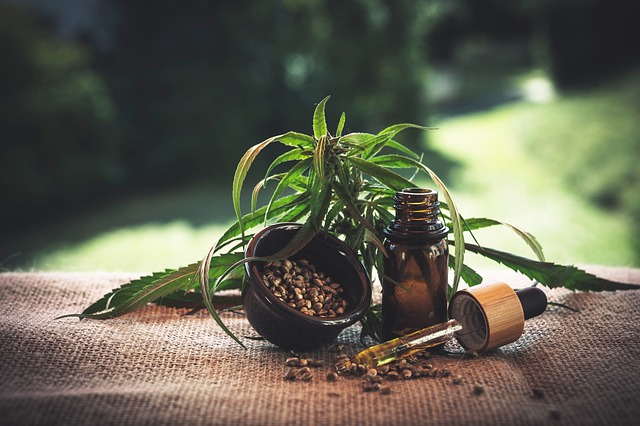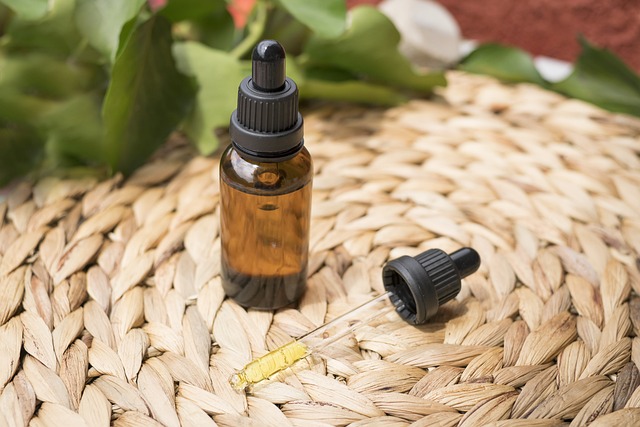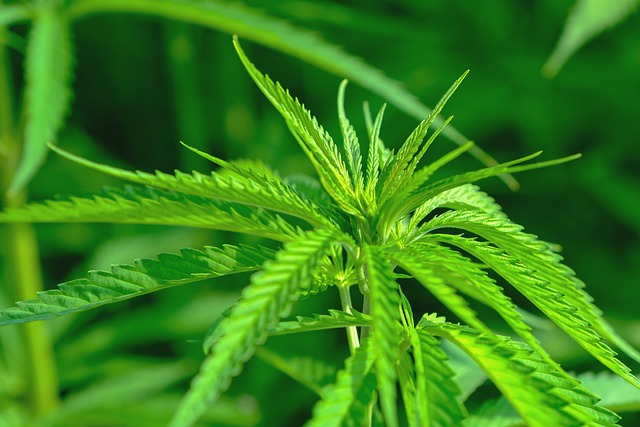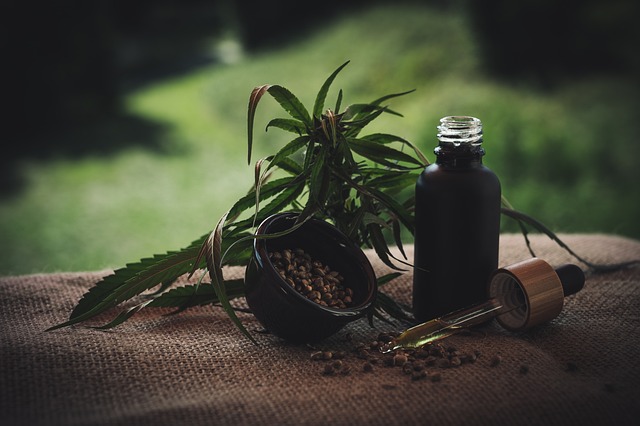Full Spectrum Hemp Oil (FSO) is a potent extract from the Cannabis sativa plant that includes a range of cannabinoids like CBD, CBC, CBG, trace amounts of THC, and beneficial compounds such as terpenes and flavonoids. Unlike isolated forms, FSO provides a complete profile that leverages the "entourage effect," a phenomenon where the combined effects of these compounds are more powerful than their individual effects, potentially offering enhanced therapeutic benefits. With THC levels capped at 0.3% on a dry weight basis, FSO remains non-psychoactive and compliant with federal regulations in the U.S. Quality FSO should be sourced from reputable hemp farms, using clean CO2 extraction methods, and third-party lab testing to ensure safety, purity, and potency. The entourage effect maximizes the health advantages of full spectrum hemp oil by optimizing the interaction with the endocannabinoid system. It's essential for consumers to understand dosing, administration, and legal considerations when incorporating FSO into their wellness routine. The 2018 Farm Bill in the U.S. legalized FSO containing less than 0.3% THC, but state-specific regulations may still apply. Retailers and manufacturers must adhere to these regulations to provide safe and effective full spectrum hemp oil products.
Exploring the multifaceted benefits and intricate science behind Full Spectrum Hemp Oil, this article sheds light on its potency and effectiveness. From delving into its composition and the role of cannabinoids to understanding how cultivation practices influence quality, we’ll cover the critical aspects that enhance its potency. Additionally, we’ll navigate the legal framework governing accessibility, ensuring readers are well-equipped with knowledge on how to incorporate this natural wellness aid into their daily routine effectively. Join us as we unravel the mysteries of Full Spectrum Hemp Oil and its significant impact on health and well-being.
Understanding Full Spectrum Hemp Oil: A Comprehensive Overview

Full Spectrum Hemp Oil (FSO) is a natural extract derived from the Cannabis sativa plant, rich in cannabinoids and other beneficial compounds. Unlike its isolated counterparts, FSO contains a full range of cannabinoids, including CBD (cannabidiol), CBC (cannabichromene), CBG (cannabigerol), THC (tetrahydrocannabinol), and many other phytochemicals found in the hemp plant. This comprehensive blend is often referred to as the “entourage effect,” where the collective action of these compounds is believed to be greater than the sum of their individual effects. This synergistic interaction enhances the potential therapeutic properties of the oil, making it a preferred choice for consumers seeking natural wellness support. The presence of THC in FSO is typically less than 0.3% on a dry weight basis, ensuring that the product remains non-psychoactive and legal under federal law in the United States. When selecting a Full Spectrum Hemp Oil, it’s crucial to consider the source of the hemp, the extraction method used, and the purity and potency levels of the final product. Quality FSO should be third-party lab tested to confirm its cannabinoid profile, terpene content, and to ensure the absence of contaminants like heavy metals or pesticides, providing consumers with a safe and reliable wellness option.
The Entourage Effect: How Whole-Plant Extracts Amplify Benefits

Full spectrum hemp oil harnesses a multitude of cannabinoids, terpenes, and flavonoids inherent in the hemp plant, which collectively work to amplify its therapeutic benefits. This synergistic interaction is what scientists refer to as the Entourage Effect. Unlike isolated cannabinoid products, full spectrum hemp oil provides a comprehensive profile that mimics the natural composition of the cannabis plant. This holistic approach ensures that users benefit from the combined effects of all the components present in the extract. The various cannabinoids, such as CBD (cannabidiol), THC (tetrahydrocannabinol), and others like CBG (cannabigerol) and CBN (cannabinol), work in concert to enhance each other’s effects. Similarly, the terpenes and flavonoids found in full spectrum hemp oil contribute to its overall efficacy by influencing how cannabinoids interact with the body’s endocannabinoid system, potentially leading to a more potent and well-rounded experience than isolated compounds can provide. This complex interplay underscores the significance of choosing full spectrum hemp oil for those seeking optimal health benefits.
Composition and Cannabinoids: What's in Full Spectrum Hemp Oil?

Full Spectrum Hemp Oil is a rich and complex extract derived from the Cannabis sativa plant, which contains a wide range of naturally occurring compounds. Unlike isolates that contain only one cannabinoid, such as CBD (cannabidiol), full spectrum hemp oil includes all the cannabinoids found in the hemp plant, including THC (tetrahydrocannabinol) at levels below 0.3% which is legal in many jurisdictions. This comprehensive composition is often referred to as the “entourage effect,” where the various compounds—cannabinoids, terpenes, flavonoids, and fatty acids—work synergistically to enhance each other’s effects, potentially offering a broader spectrum of benefits than isolates or broad-spectrum products.
The cannabinoid profile in full spectrum hemp oil is particularly noteworthy due to the presence of CBD alongside minor cannabinoids such as CBC (cannabichromene), CBG (cannabigerol), and CBN (cannabinol). These compounds, along with trace amounts of THC, contribute to the oil’s therapeutic properties. The terpene content, which imparts the distinctive aromas and flavors, also plays a crucial role in influencing the effects of the cannabinoids. For instance, myrcene is known for its sedative properties, while limonene is associated with uplifting and energizing effects. This intricate blend is what makes full spectrum hemp oil a popular choice among consumers seeking the potential therapeutic benefits of cannabis without the psychoactive effects associated with higher THC strains.
Sourcing and Cultivation: Ensuring High-Quality Full Spectrum Hemp Oil

In the realm of full spectrum hemp oil production, the journey from seed to bottle is meticulously managed to ensure the highest quality product. The sourcing of hemp plants begins with selecting reputable farms that adhere to strict cultivation standards. These farms are often certified organic, guaranteeing that the hemp grown is free from harmful pesticides and herbicides, which can compromise the oil’s purity and efficacy. The cultivation process is a delicate balance of environmental conditions and agricultural practices aimed at optimizing cannabinoid profiles while preserving the plant’s natural terpene and flavonoid content. This holistic approach not only enhances the potency of the hemp oil but also maintains the integrity of the ‘entourage effect,’ which is crucial for the oil’s therapeutic benefits.
Once harvested, the hemp undergoes a careful extraction process that captures the full range of cannabinoids, including CBD, CBC, CBG, and trace amounts of THC, alongside other valuable compounds. The extraction method employed is typically CO2 extraction, which is considered one of the most efficient and clean methods available, ensuring no residual solvents remain in the final product. After extraction, the oil is then subjected to a series of rigorous quality control tests to verify its potency, purity, and safety. This dedication to quality control from farm to finished product ensures that consumers receive a full spectrum hemp oil that is both potent and consistent, delivering the broadest range of beneficial cannabinoids in their natural synergy for optimal wellness support.
The Role of Terpenes in Full Spectrum Hemp Oil

Full Spectrum Hemp Oil contains a rich array of compounds, including terpenes, which play a pivotal role in enhancing its potency. Terpenes are aromatic hydrocarbon compounds found in many plants and are abundant within hemp. They not only contribute to the distinct flavors and fragrances of the plant but also interact with the body’s endocannabinoid system, influencing its response to cannabinoids like CBD and THC. This entourage effect, as it is known, is crucial for the therapeutic benefits associated with full spectrum hemp oil. It is believed that terpenes can modulate inflammation, provide analgesic effects, and contribute to anxiolytic properties, making them a key component in the overall efficacy of the product. Users often report more pronounced effects from full spectrum hemp oil compared to isolated cannabinoid products, which is attributed to the synergistic impact of terpenes and other cannabinoids within the oil.
Utilizing Full Spectrum Hemp Oil: Dosage, Methods, and Best Practices

When incorporating Full Spectrum Hemp Oil into one’s wellness regimen, understanding proper dosage and administration methods is paramount for optimal results. Full Spectrum Hemp Oil contains a wide range of cannabinoids, including CBD, CBC, CBG, terpenes, and less than 0.3% THC, which work synergistically to maximize the oil’s therapeutic benefits—a phenomenon known as the entourage effect. To determine an effective dosage, it’s essential to consider individual body chemistry, weight, and the specific condition being addressed. Generally, dosages can range from a few milligrams of CBD to over 100 mg per day, divided into two or three doses. It’s advisable to start low and go slow, incrementally increasing the dose until the desired effect is achieved. Sublingual administration, where the oil is placed under the tongue and held for about a minute before swallowing, allows for direct absorption into the bloodstream, enhancing bioavailability and onset of effects. Alternatively, Full Spectrum Hemp Oil can be mixed with food or beverages, though this method may take longer to take effect due to the oil’s passage through the digestive system. Regardless of the chosen administration method, consistency is key for maintaining a steady state of cannabinoids in the body. Additionally, purchasing high-quality Full Spectrum Hemp Oil from reputable sources ensures that users receive a product with consistent potency and purity, which is critical for achieving the best outcomes. Adhering to these best practices will help individuals navigate the benefits of Full Spectrum Hemp Oil effectively for their health and wellness goals.
Legal Landscape and Accessibility: Navigating the Availability of Full Spectrum Hemp Oil

The legal landscape surrounding full spectrum hemp oil has undergone significant transformation, with regulatory changes paving the way for broader accessibility across various jurisdictions. The 2018 Farm Bill in the United States federalized hemp, including its derivatives, provided they contain less than 0.3% THC, effectively legalizing full spectrum hemp oil. This legislation has catalyzed a surge in market availability, allowing consumers to access this cannabinoid-rich extract more readily than ever before. However, despite these federal guidelines, state laws can still impose restrictions or vary in their approach to hemp products. It is imperative for consumers to be well-versed in the specific legalities of their region to navigate these nuances without risking compliance. The disparity in state laws underscores the importance of staying informed about local regulations, as they can significantly influence the availability and legality of full spectrum hemp oil. Additionally, the evolving nature of hemp policy necessitates ongoing vigilance to ensure sustained access to this product within the legal framework. Retailers and manufacturers play a crucial role in adhering to these regulations to provide consumers with safe, high-quality full spectrum hemp oil products.
